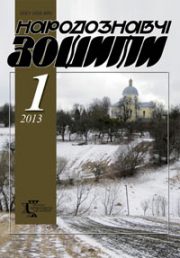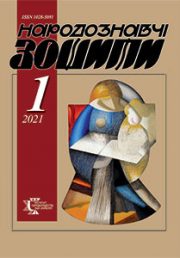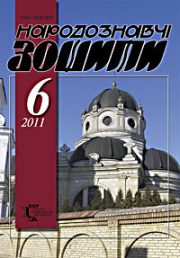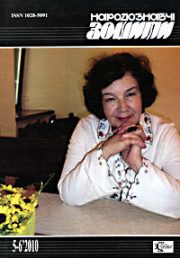The Ethnology Notebooks. 2022. № 2 (164), 281—286
UDK [821.161.2-32.09:355.425.4(477.8)”19″УПА]”1951″Є.Дмитрик
DOI https://doi.org/10.15407/nz2022.02.281
ROZDOLSKA Iryna
- ORCID ID: https://orcid.org/0000-0002-3308-1981
- Doctor of Philological Studies,
- Docent, professor, Ivan Franko National University of Lviv,
- The Mykhailo Vozniak Department of Ukrainian Literature,
- 1, Universytetska Str., Lviv, Ukraine, 79000,
- Contacts: e-mail: yaremchuk.iryna74@gmail.com
Abstract. The article focuses on the artistic work of the Ukrainian underground participant Yevhen Dmytryk—Zynoviy Matla. The article is designed to actualize the axiological guidelines of Ukrainian Resistance literature on the example of individual works with attention to the person’s moral and ethical principles of Ukrainian Resistance spiritual identity as of a heroic man, with the image of heroic faith, which is the purpose of the study. Moreover, the axiological meaning of the text of the era of Ukrainian national liberation struggles is actualized in the leading folklore studies of our time on this topic (O. Kuzmenko, M. Demidyuk).
The objects of the research are the works «My Mother», «On the stubble», «Maruna’s Chugaister», «Cover», «Gazda Timothey Havryliv».
The subjects of the research are the valuable dominants of the heroic personality. It is researched that the spiritual identity of Z. Matla’s hero is shown in the situation of existential choice in borderline circumstances on the line of «life — death», and local intrapersonal values to give way to ideal, national values.
In the research methodology — the principle of historicism, the principles of cultural-historical, biographical, structural-semiotic, national-existential approaches are used. Insights by Vasyl Barka, Oksana Kuzmenko, and Maryna Demidyuk became inspiring for the formation of a research focus on Resistance literature in the aspect of existential-axiological dominants of the hero’s image.
As a result, it was noticed that the artistic image of the world of «Insurgent Essays» is constructed antithetically, in which its inhabitants undergo a spiritual initiation to test moral guidelines that go beyond individual good. The world-creating axis acquires moral and generally spiritual meanings — this is the axis of good and evil. The fact that the anti-world penetrates the world through its representatives and some irreversible vicissitudes of life of the characters makes the apocalyptic clash more dramatic. The situation of existential maximum in the face of death reveals the axiological attitude of the individual, his national ideal, and through them — the personal quality of a heroic personality.
In conclusion, it is noted that the heroes of «Insurgent Essays» in the struggle against the tanatic circumstances of the antiworld claim their own «image of heroic faith» (Zenon Husar) at the intersection of values of good and evil, happiness, misery, life, death, truth — betrayal. The particular desire to live, not only to survive, but also live in own ethno-space, national spiritual continuum with the coordinates of Mother, God, Ukraine and positive existentials of faith, hope, love undergoes transformation.
Keywords: Zynoviy Matla, Yevhen Dmytryk, OUN, UIA, literature of Ukrainian Resistance, values, spiritual identity, hero.
Received 10.04.2022
REFERENCES
- Salyha, T.Yu. (1994). Poetry of UIA soldiers. In History of Ukrainian Literature ХХ century (Pp. 48 —52). Kyiv: Lybid [in Ukrainian].
- Rozdolska, I. (2000). Ukrainian poetry of resistance of the 40—50’s of the XX century: genetic context and aesthetic nature. The thesis for the academic degree of Candidate of Philogical Sciences with a specialization in Ukrainian Literature. Lviv [in Ukrainian].
- Yaremchuk (Rozdolska, I.). (2006). Under the sign of fire: Genetic context and aesthetic nature of UIA poetry: Monograph. Lviv [in Ukrainian].
- Dmytryk (Matla, Z.). (1951). Insurgent essays. Miunkhen: Ukrainskyi samostiinyk. Retrieved from: https://diasporiana.org.ua/proza/2406-dmitrik-ye-povstanski-narisi/ (Last accessed: 05.12.2021) [in Ukrainian].
- Matla, Z. (2009). Our days are immortal: short stories. Kyiv: Wolf [in Ukrainian].
- Yaremchuk (Rozdolska, I.). (2010). From the literary heritage of Ukrainian resistance: short stories by Zinovii Matla. The Bell, 1, 129—136 [in Ukrainian].
- Vasylenko, V. (2014). Interpretation of forest people in the short stories of Zinoviy Matla. Homeland, 2 (31), 46—54 [in Ukrainian].
- Barka, V. (1954). The Artistik Literature of The Ukrainian Undeground. In The Ukrainian Insurgent Army in fight for freedom (Pp. 52 —54). New York: United committee of tne Ukrainian-American organizations of New Yourk.
- Demedyuk, M. (2020). Values of good and evil in the struggle of totalitarian systems (based on a folklore narratives about the events of national liberation struggles of the 40—60’s of the twentieth century). In Collection of scientific works based on the materials of the All-Ukrainian scientific-practical conference with international participation «Totalitarianism as a system of destruction of national memory» (Pp. 72—75). Lviv: Drukarnia Lvivskoho natsionalnoho medychnoho universytetu imeni Danyla Halytskoho. Retrieved from: http://elartu.tntu.edu.ua/bitstream/lib/32620/2/TSDNM_2020_Demediuk_M-Tsinnosti_dobra_i_zla_v_72-75.pdf (Last accessed: 05.12.2021) [in Ukrainian].
- Demidyuk, M. (2021). Axiological landmarks in folklore narratives about the national liberation struggle of the 1940’s and 1960’s. (based on field materials from Volyn Polissya). The Ethnology notebooks, 1 (157), 19—27. Retrieved from: https://nz.lviv.ua/archiv/2021-1/4.pdf (Last accessed: 05.12.2021) [in Ukrainian].
- Kuzmenko, O. (2018). Dramatic human existence in Ukrainian folklore: conceptual forms of expression (the period of XXI and XXII): monograph. Lviv: Instytut narodoznavstva NAN Ukrainy [in Ukrainian].
- Savchyn, M. (2014). Spiritual identity as a defining characteristic of a perfect personality. Scientific notes of the National University «Ostroh Academy». Series: Psychology and pedagogy, 24, 112—118. Retrieved from: http://nbuv.gov.ua/UJRN/Nznuoapp_2014_27_29 (Last accessed: 05.12.2021) [in Ukrainian].
- Denysyuk, I. (1999). Development of Ukrainian short prose of the XIX — early XX century. Lviv: Akademichnyi ekspres [in Ukrainian].
- Husar, Z. (2007). Poetry of heroic faith. The Bell, 10, 142—143 [in Ukrainian].







